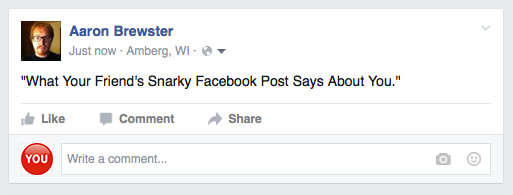|
"I have a theory I don't think you're going to like, but I believe you may be curious enough to hear me out." Pretend you're scrolling down your newsfeed. Don't actually do it! I'll lose you for the next three hours. Just pretend. So, you're scrolling along and you see "that friend" has posted yet another snarky comment. You read the post (despite your better judgement), and you're as annoyed as you knew you would be. They're so arrogant/annoying/asinine/audacious! Then comes the well-known internal debate as to whether or not you should take the time to respond. Oh, how you wish Facebook had a "Dislike" button. However, what happens next is not the subject of this article. Let's rewind. I'd like you to re-read that comment on your imaginary newsfeed. Likely, you may even be recalling a real post "that friend" has posted before. How does it make you feel? Why? Why did what they say make you feel that way? I have a theory I don't think you're going to like, but I believe you may be curious enough to hear me out. You know that old saying "You are what you read"? Well, there's more truth there than meets the ear. How Communication Works Did you know that over 90% of what you communicate does not come from the words you use? Voice inflection, facial expression, body language, gestures, breathing, eye direction -- it all screams your real meaning. We've all seen the examples where you read a sentence putting emphasis on different words. "My favorite color is green." "My favorite color is green." "My favorite color is green." "My favorite color is green." You get the point. By the way . . . my favorite color is green. Many of us have also taken a Speech class where we've heard people say the words "I love you" with various tones and levels of affection and angst. Some people have gotten punched because of how they said, "I love you." But none of that has anything to do with your friend's snarky post. None of those nonverbals actually exist in written communication. All you have are words. Imagine stripping communication of 95% of what you're used to experiencing! That's what the written is compared to the verbal for people living in the 200's. It's like giving an accomplished pianist a Schroder-sized piano. Mere words seem almost incapable of communicating much of anything. In fact, if this were a video, I guarantee more people would have made it to this point because it would be so much more interesting with a talking head attached to it. The problem lies in the fact that your friend's social snarkiness has no three-dimensional life. There are no curled lips or agitated tones. It's like a blank canvas awaiting the artist. The canvas is the post. You are the artist. Your paint is your own non-verbal communication styles. How We Interpret Written Communication In our video-saturated and emotionally super-charged culture, our attention deficit brains are constantly trying to avoid reading. It's not as flashy. It's "boring." So, when we find ourselves reading out of necessity, we fill in the blanks with our own palate of nonverbals. When we read: "Stop complaining about Mondays." . . . our imaginations start splashing these mere words with loads of assumed meaning. Some people read the above statement with a furrowed brow and agitated timbre. They hear the comment continuing like this: "Stop complaining about Mondays, you diaper-wearing pansy! Put on your big-boy galoshes and man up!" Others hear a gentle admonition: "Stop complaining about Mondays. God's been so good to us, how could we possibly grumble about the gift He's blessed us with today." And what's really interesting is, some of you had a hard time hearing the gentle tone and encouraging smile in the second reading. You are what you read. If you read comments like the one above -- comments divorced from any emotionally invested words -- and you "hear" condescension . . . it's probably because you're a condescending person. If "that friend" writes, "I'm not going to vaccinate my child." . . . and you "hear" aggressive, accusative snark, it's likely because that's how you'd like to reply, "Well, I am going to vaccinate my child, you imbecilic brainwashed sheep-quack!" Negative people hear vitriolic threats where positive people hear friendly reminders. People have super-imposed their own communication styles onto their reading for as long as people have been reading, but we have four unique contemporary factors to battle with:
Because of the weight of our culture, it's so incredibly easy to "hear" emotion the author never intended. But What if The Writer Really Is Snarky? Well, that happens. Words have meaning, and certain combinations can reduce the strongest man to a baby wipe. But what if we actually gave people the benefit of the doubt? You know . . . love people? I Corinthians 13:7 tells us that love hopes all things and believes all things. When that generally antagonistic person writes "I need coffee," what would it hurt to "hear" those words being said in the most Christ-honoring way possible? Why assume the worst? The real problem is that people who struggle hearing positive emotions in written communication are people who struggle speaking that way in real life. Loving, kind, optimistic, joyful, gentle people rarely read nasty voice inflection when it's not there to be heard because that's not who they are . . . even if that is exactly who the author is. Be careful that you are not what you read. When that Facebook post rubs you wrong because you can just "hear" the snark pouring over every syllable, push the device away from you, pray, and try reading the comment again . . . this time lovingly giving the writer the benefit of the doubt. It may turn out that the author really is a nasty people. But at least you won't be one too.
0 Comments
Leave a Reply. |
Receive UpdatesJoin The TLP Family and receive email updates when we publish new articles and episodes.
Subscribe to Our PodcastCategories
All
Archives
July 2024
|
Truth.Love.Family.
- Truth.Love.Family.
- Donate
-
Podcast
-
Special Guests
>
- Ryan & Kim Ahrens
- Scott & Becky Aniol
- George Barna
- Dave Bender
- Alan Benson
- Carolyn Brewster
- Tim Challies
- Natasha Crain
- Kristen Clark
- Hillary Morgan Ferrer
- Todd Friel
- Ken Ham
- Jay Holland
- Kristen Jenson
- Chris Kaspar
- Becky Keife
- Heath Lambert
- Jessica Mair
- Dr. Joe Martin
- Mark Massey
- Katie Miller
- Jim Newheiser
- Steve Pettit
- Shannon Popkin
- Aaron & Elaina Sharp
- Mark Shaw
- Lynna Sutherland
- Nathan & Anna Sutherland
- Brandon Talley
- Arthur C. Woods
- Episodes by Series
- Episodes by Topic
- Where to Listen
-
Special Guests
>
- Community
-
Resources
- Counseling
- Speaking
- The Celebration of God
- AMBrewster.com
- Evermind Store
|
To submit general questions or ideas for future episodes: [email protected]
To request specific assistance for your family: [email protected] |
We are a participant in the Amazon Services LLC Associates Program. As an Amazon Associate, we earn from qualifying purchases. Click any Amazon link at TruthLoveParent.com, shop as usual, and TLP will receive commissions off all of your sales! Click here to learn more.
Site powered by Weebly.






 RSS Feed
RSS Feed
